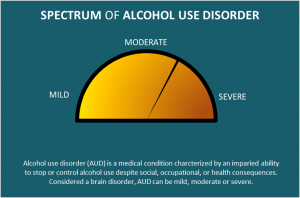NATIONAL ALCOHOL AWARENESS MONTH
April is National Alcohol Awareness Month
Every April, we promote Alcohol Awareness Month to increase awareness and understanding of the causes and treatments available for alcohol use disorder (AUD).
AUD encompasses conditions that are referred to as alcohol abuse, alcohol dependence, alcohol addiction, and alcoholism. AUD is a medical condition characterized by an impaired ability to stop or control alcohol use despite adverse social, occupational, or health consequences. Considered a brain disorder AUD can be mild, moderate, or severe.
Each year, more than 95,000 people die from excessive alcohol use in the U.S. Excessive alcohol use is a health risk to Men and Women. Are you at risk?

What increases your risk of alcohol use disorder?
Your risk of developing AUD depends on a variety of factors including how much, how often, and how quickly you consume alcohol. Alcohol misuse including binge drinking and heavy alcohol use over time increases your risk of AUD. Other factors also increase your risk of AUD, such as:
- Drinking at an early age
- Genetics and family history of alcohol problems
- Mental health conditions and a history of trauma
What are the symptoms of AUD?
Diagnosing AUD is accomplished by assessing symptoms and severity utilizing the Diagnostic and Statistical Manual of Mental Disorders, Fifth Edition (DSM-5). Some of the questions you may be asked during an assessment include:
In the past year, have you:
- Had times when you ended up drinking more, or longer than you intended?
- More than once wanted to cut down or stop drinking, or tried to, but couldn’t?
- Spent a lot of time drinking? Or being sick or getting over other aftereffects?
- Wanted a drink so badly you couldn’t think of anything else?
- Found that drinking-or being sick from drinking-often interfered with taking care of your home or family? Or caused job troubles? Or school problems?
- Continued to drink even though it was causing trouble with your family or friends?
- Gave up or cut back on activities that were important or interesting to you, or gave you pleasure, in order to drink?
- More than once gotten into situations while or after drinking that increased your chances of getting hurt (such as driving, swimming, using machinery, walking in a dangerous area, or having unprotected sex)?
- Continued to drink even though it was making you feel depressed or anxious or adding to another health problem? Or after having had a memory blackout?
- Had to drink much more than you once did to get the effect you want? Or found that your usual number of drinks had much less effect than before?
- Found that when the effects of alcohol were wearing off, you had withdrawal symptoms, such as trouble sleeping, shakiness, restlessness, nausea, sweating, a racing heart, or a seizure? Or sensed things that were not there?
- Published: March 15, 2022
- Updated: May 3, 2023


